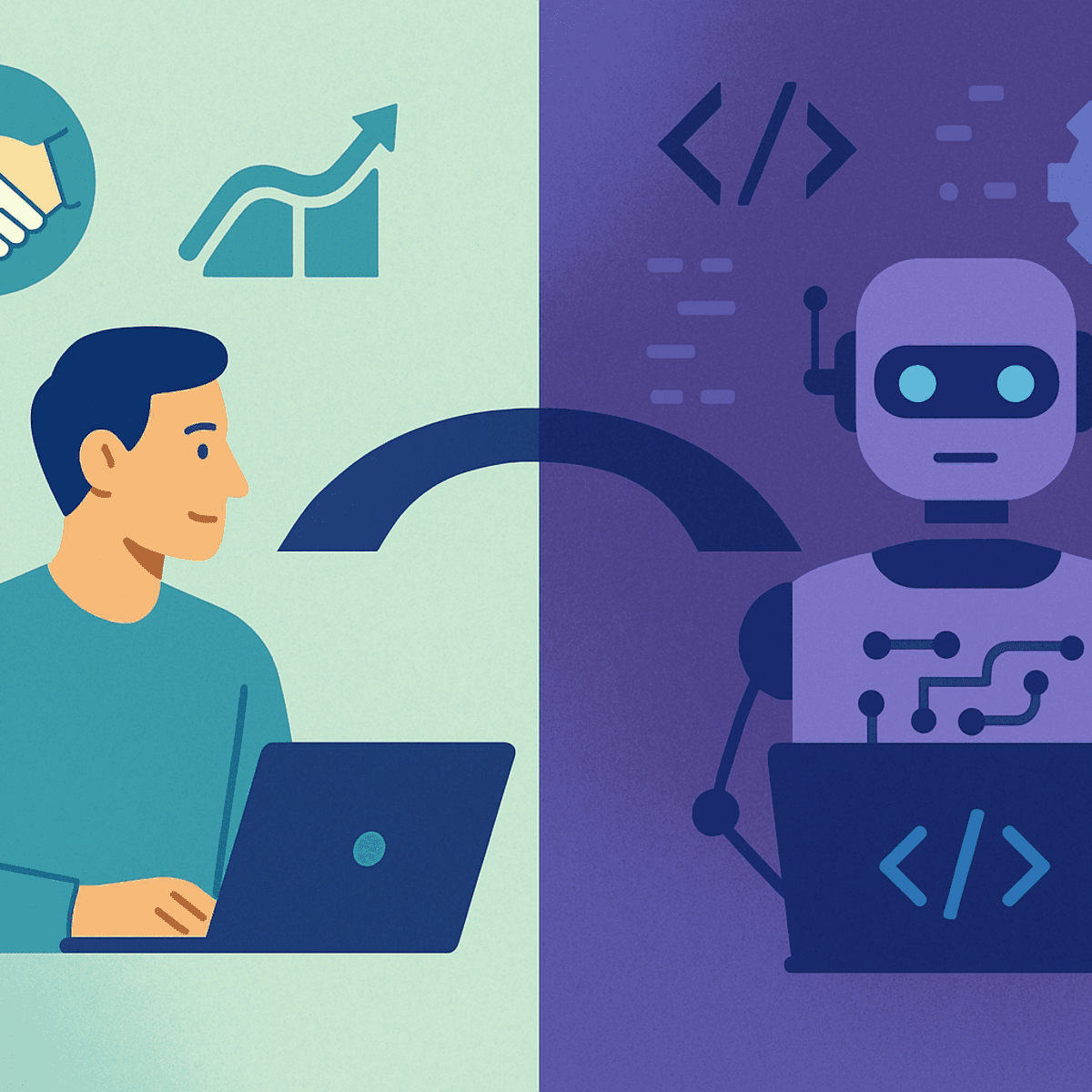Article
April 16, 2025
Reliability Over Skills: The Developer Qualities That Matter Most in the AI Age
SHARE

In today's rapidly evolving technological landscape, where artificial intelligence can generate thousands of lines of code in minutes, what truly defines the value of a developer? As AI tools become increasingly sophisticated, the question of what makes a human developer irreplaceable takes on new urgency and meaning.
The Shifting Value Proposition
The traditional hiring approach has often prioritized technical skills—proficiency in specific languages, frameworks, and tools. But in an era where ChatGPT and other AI tools can write complex functions, debug code, and even design system architecture, technical knowledge alone is no longer the primary differentiator it once was.
What remains uniquely human—and therefore increasingly valuable—are qualities that AI cannot replicate: reliability, trustworthiness, learning agility, humility in acknowledging mistakes, and the patience to methodically solve complex problems.
The Human Elements AI Cannot Replace
Reliability and Consistency
While AI can work without breaks, it cannot demonstrate true reliability in the human sense. Reliability isn't just about producing code; it's about:
- Following through on commitments despite obstacles
- Communicating proactively when challenges arise
- Maintaining quality standards even under pressure
- Building trust through consistent performance over time
An AI tool might generate code on demand, but it can't take ownership of a project's success or navigate the complex human dynamics that influence development outcomes.
Willingness to Learn and Adapt
Technology evolves rapidly, making the ability to learn new skills and approaches essential. Human developers with a growth mindset bring several advantages:
- Curiosity that drives exploration beyond established patterns
- Critical thinking to evaluate which new technologies merit adoption
- Judgment about when to apply emerging tools versus proven approaches
- The ability to transfer knowledge across domains in novel ways
AI can process information but lacks the intrinsic motivation and metacognitive abilities that drive human learning and adaptation.
Accountability and Error Recognition
The most valuable developers aren't those who never make mistakes—they're those who:
- Acknowledge errors without defensiveness
- Take responsibility for identifying solutions
- Learn systematically from failures
- Apply those lessons to prevent similar issues in the future
AI can identify bugs but lacks the ethical framework and personal investment that drives accountability. It cannot feel the weight of responsibility that pushes humans to grow from their mistakes.
Emotional Intelligence and Collaboration
Software development is fundamentally collaborative, requiring:
- Active listening to understand stakeholder needs
- Empathy when working with colleagues facing challenges
- Patience when explaining technical concepts to non-technical team members
- Resilience through the inevitable frustrations of complex projects
These social and emotional capabilities remain uniquely human and essential to successful technology development.
The Ethics Factor
Perhaps most importantly, human developers bring ethical judgment to their work. They can:
- Question whether a feature should be built, not just how to build it
- Consider the broader societal implications of technical decisions
- Push back against potentially harmful applications
- Advocate for inclusive, accessible design
AI can follow ethical guidelines programmed into it but cannot independently develop or apply moral reasoning to new situations.
A New Hiring Paradigm
Forward-thinking organizations are already shifting their hiring criteria to emphasize these human qualities. Technical skills remain important but increasingly serve as baseline requirements rather than key differentiators.
The most valuable interview response might sound something like this:
"Thank you for this opportunity. I understand that reliable team members are essential for any company's success. While technical skills are important, I believe that willingness to learn and consistency are equally valuable when developing quality products.>
If you're looking for a dependable and trustworthy team member, I would be honored to join your organization. I'm committed to learning any new skills required for the role and addressing any knowledge gaps I may have. I'm ready to implement what I know and eager to grow in areas where I need development."
This response demonstrates self-awareness, humility, commitment to growth, and recognition of what truly matters in a development team.
Leveraging AI While Valuing Human Contributions
The optimal approach isn't to dismiss AI tools but to recognize their proper place. The most effective developers will be those who:
- Utilize AI to handle routine coding tasks, freeing human creativity for higher-level challenges
- Apply human judgment to evaluate and refine AI-generated solutions
- Maintain awareness of AI's limitations and know when human expertise is essential
- Continue developing uniquely human capabilities alongside technical skills
Conclusion
As we navigate the evolving relationship between human developers and AI tools, organizations that recognize and value reliability, trustworthiness, learning agility, and other human qualities will build more resilient and innovative teams.
Technical skills can be taught or augmented with AI. Character, reliability, and the deeply human qualities that build trust take years to develop and remain irreplaceable. In the age of AI, perhaps paradoxically, the most technical field is increasingly defined by the most human attributes.
For developers navigating this new landscape, the message is clear: while continuing to develop technical capabilities, invest equally in the human qualities that AI cannot replicate. These are not just differentiators in the job market—they are the foundation of meaningful contributions to technology that serves human needs ethically and effectively.
Words About My Words
No comments yet.
Share Your Experience
Give a star rating and let me know your impressions.
You Might Also Like
Loading related articles...